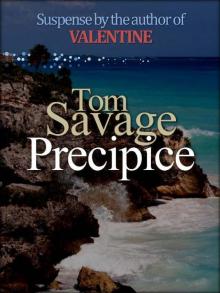- Home
- Tom Savage
Precipice Page 20
Precipice Read online
Page 20
She watched as Kay lit a fresh cigarette and gazed down at the roofs of the houses below them. From Gladys Bellamy’s terrace, perched on this hillside above Charlotte Amalie, they had a dramatic view of the town and the harbor at the bottom of the hill. The buildings crowded down to the water, which stretched out, dull and choppy, as far as they could see. The distant mountains on the other side of the curved bay were a misty, indistinct green in the muted light of the overcast afternoon. The angry, pewter-colored clouds hung down, obliterating the topmost points of land. Tiny cars crawled along the waterfront roads far below, and ant-sized people walked on the esplanade at the top of the seawall that ringed the harbor. The everyday bustle of life was apparent wherever they looked, yet not a sound reached them. The silence of the island was as thick, as oppressive, as the gathering storm.
“It always amazes me,” Kay said, “how suddenly the weather can change here. It was so beautiful this morning. I hope it doesn’t rain before lunch, or they’ll have to move all that inside.” She waved an arm, including the buffet table Mrs. Bellamy had set up at one end of the patio. The linen tablecloth flapped in the wind, held down by the huge silver platters of ham and chicken and salad. The two white-jacketed housemen flanking the feast looked nervously at the sky, then at each other.
Five other people stood or sat about the little garden in front of the big gray Danish plantation house, a relic of an earlier, more romantic St. Thomas. Every month the Arts Council had lunch at the home of one of its members. Mrs. Bellamy, the current chairperson, a large, imposing native woman in a brightly printed dress, was regaling the others with a story from her long-ago days as Gladys Rollins, a rather well known opera singer, before she returned to the island and married one of its wealthiest citizens. They were, Trish thought, an oddly mismatched cross section of island society. The current panel included herself, Kay, Mrs. Bellamy, a young native man who was a talented sculptor, an elderly native man renowned as a Calypso singer under the name King Caribbean, and two young men from New York who had been dancers on Broadway before coming to St. Thomas and opening a men’s clothing shop.
“You haven’t answered me,” Trish said, reaching for the cup. ‘You seem to be preoccupied today. Tell me what’s going on before La Gladys drags us over to the trough.”
In spite of herself, Kay giggled. “Hush! One of these days she’s going to hear you calling her that.”
“Big deal. Maybe she’ll think twice before she decides to favor us with ‘The Bell Song’ again at the next talent show. I swear, if I have to sit through that one more time—”
“All right,” Kay said quickly, glancing over at the others and raising a hand to nip Trish’s monologue in the bud. She rose and went over to the railing at the edge of the terrace. “I was just wondering, why Diana Meissen? I mean, what role does she play in my life? Everything was just going along, you know, okay but uneventful. Then, all of a sudden, Sandra takes off and this new girl arrives, and the most extraordinary things are happening. I felt a little competition from her, so I guess I made an extra effort in the way I look, and now Adam is . . . responding to me much more strongly than he has in a long time.”
“You mean sex?” Trish leaned forward, eyes wide.
Kay reddened slightly. “Uh-huh. That young man takes an interest in her, and suddenly I’m playing matchmaker, trying to get them together. Lisa has never behaved so well. Hell, she even got Jumbi to like her! And then on the boat the other day, she saved my life.” She turned to look at Trish, lowering her voice. “Then this bizarre thing happens to Sandra. I mean, it’s awful, really. Nobody should die so senselessly. But, funny thing: all I could think was that it was all somehow meant to happen. To prove to me that I was doing the right thing. That I was supposed to meet Diana when I did and take her into our lives. I was in the Fort Friday, looking through Sandra’s belongings, and when I came out and went to my car, something very strange happened to me. Oh, God, this sounds so weird. . . .”
Trish stood up and went to stand beside her friend. She raised a hand and placed it on Kay’s arm, cringing slightly as their privacy was briefly invaded by the piercing mezzo-soprano giggles of the former Gladys Rollins on the other side of the terrace.
“God, she even laughs in High C! What, Kay? What is it?”
Kay emitted a long sigh. “I suddenly thought, yes. This is right. This marvelous young woman has taken me out of myself. She’s taken charge of the house, of my finances, of Lisa. She’s brought Adam and me closer together. She’s put . . . something back in my life that I never even noticed was missing. I walked right by my car: if I hadn’t remembered myself, I would have walked all the way home.” She shook her head slightly as if to clear it. “Are there really people like that, Trish? Or am I just imagining it? You know, it’s almost funny: at first I thought she was after Adam. Isn’t that silly?”
Trish decided that the question was rhetorical and wisely remained silent.
“Come on, you two!” the resonant, pear-shaped tones of their hostess called to them, breaking the odd spell.
“Ah,” Trish sighed. “Her nibs awaits. Let’s get over there pronto, before she breaks into the third act of La Bayadère.”
Kay laughed. “That’s a ballet, not an opera.”
Trish glanced over at the rotund figure of the former diva. “Even worse! What do you feel like doing after the meeting?”
“Sorry,” Kay replied. “You’re on your own this afternoon. I have an appointment.”
Trish, Great Friend, understanding confidante, brushed off the dismissal. She grinned. “Race you to the table,” she said.
And did.
Margaret told herself that she had every right to be here in this room again, but she didn’t believe it. She felt odd, out of place, vaguely embarrassed, despite the fact that there was no one to witness her transgression. Mrs. O’Rourke had gone on her weekly trip to the supermarket, so she was alone in the house. She sat on the blue chenille coverlet at the very edge of the bed, as she had one week before, when Dr. Stein brought her here.
All right, she corrected herself, I brought him here. No sense in laying blame at another’s doorstep. I am responsible for my actions. I alone.
Her gaze traveled slowly around the room. With an effort, she cleared her mind of everything that had been raging through it for the past five weeks, ever since the morning when the girl kissed her lightly on the cheek and fairly danced away down the sidewalk to the waiting taxi, bound for—
For what? For an island in the Caribbean, nearly three thousand miles away. For a family she’d apparently never met before, a woman named Kay Prescott and her husband and child. For a paid position, a job as a governess or companion, little more than a domestic. A servant.
If she looked at it truthfully, it was this fact that most bothered Margaret. The idea that a Barclay would place herself—willingly—in a position that was subservient, ignominious, declasse. Was this how the girl defined happiness, the extent of her ambition? The depth and breadth and height her soul could reach? A servant.
Enough, she commanded. It’s time to think calmly, rationally, as much like the girl as possible.
She nearly laughed aloud at the irony. Calm? Rational? Since when were these appropriate words to describe the machinations of her niece’s mind? Edith Hamilton’s Mythology: that was her bible, the creed to which she subscribed. The goddess whose name she had borrowed, Medea, Clytemnestra, Electra, Antigone. Women who strapped on armor and marched into battle, who murdered their husbands and butchered their children, who went happily to their deaths defending their family name, who loved and hated and avenged themselves with a passion not even guessed at by ordinary mortals. These were her heroines, her originals, the people with whom she somehow identified herself. Goddesses, queens, princesses—and nary a governess among them. Nothing so low as a paid companion.
Wrong. Something was wrong. She had taken for herself the name of Diana, goddess of the moon and of hunting, protectress of women.
What had Dr. Stein said? Something about three forms . . . the goddess in three forms, whatever that meant. She didn’t understand it, but it sounded very grand. Hardly a suitable allusion for the hired help.
She stood up and went over to the desk. She scanned the shelves of books above it, her gaze resting at last on the end of the bottom shelf, where the Mythology had been replaced next to the volumes of Greek plays. Yes, these things were important to her niece. But why?
Without really thinking about it, preoccupied with thoughts of Sophocles and Aeschylus, she reached out and pulled open the lid of the desk. Distractedly, she let her hands roam over the contents of the little shelves and pigeonholes. Letters—no, she would not read them: that was too degrading, too much a violation. Tax returns and check registers—quite a few of them, going back several years.
Check registers.
It occurred to her, then, that she knew very little about the young woman’s finances. The two of them had never really discussed money. Margaret had paid for the girl’s education, of course, up to and including her unsuccessful attempts at college. She had been provided with food and clothing, and Margaret’s insurance policy included her as dependent, but there were things of which even Margaret was not informed.
Margaret and Madeleine had inherited a considerable fortune: about twelve million, divided equally between them. Madeleine had barely had an opportunity to touch hers. In the six months after her death her husband had gone crazy, reportedly gambling away huge sums. By the time Margaret was officially put in charge of the child, six million had dwindled to three million. This had been placed in trust for the girl, who had never mentioned it until shortly after her sixteenth birthday. At that time she’d asked Margaret, her guardian, to help her to obtain access to the interest. This Margaret had done without asking questions: it was, after all, the girl’s money, and Margaret, for all her devotion, was not her true parent. Independence and privacy were two rights that had been encouraged in Margaret, and she could do no less for the girl. Even later, when she realized that drugs and liquor and the fateful trip to Hawaii and San Francisco had been among the girl’s purchases, she could not find fault with what she, Margaret, had done. But those things had come later, after the girl was of age and would have had the funds in any case. Only now did it occur to Margaret to wonder why she’d needed money when she was sixteen.
The girl’s first act on obtaining an allowance had been to open a checking account, and all the information was here. A small stack of register booklets, records of checks written, going back ten years. Margaret flipped through them until she found the earliest one. It was the one on the bottom, of course: with her methodical mind, the girl had even stored all of these things chronologically. She had written the dates and numbers of the first and last checks recorded in the booklet on the cover in her small, neat hand. After a moment’s hesitation, Margaret sat down at the desk and opened the passbook to the first entry.
Cash. Cash. A local restaurant. A theater ticket agency. Cash. Macy’s: a rather large sum, nearly two thousand dollars. She noted the date and cast her mind back. Yes, about two weeks before the girl had left for the final boarding school, Miss Stanton’s School for Girls in New Paltz. Extra clothes, probably.
She didn’t particularly notice the unfamiliar name until she had passed it three times as she scanned the columns. When she saw it a fourth time, she stopped.
Mr. Carson Fleming, three thousand dollars.
Margaret stared down at the entry, racking her brain. The girl had never mentioned anyone named—
She went back a page. Yes, here it was again: Mr. Carson Fleming, three thousand dollars.
The first payment to Mr. Fleming had been made in the third week of September, just after the sixteen-year-old arrived at Miss Stanton’s School. The second was almost exactly three months later, in December. Then March, June, September.
She raced through the next register book, and the one after that. She flipped through the pages, the nail of her right index finger sliding down column after column. Five books in all, including the current one. She dropped the last book on the little pile before her and sat back in the desk chair, staring down.
Mr. Carson Fleming. Three thousand dollars, every three months for the past ten years. One thousand a month; two hundred fifty a week. For ten years.
That was not all. Five days after the first payment, ten years ago, while the teenager was allegedly setding in at the exclusive upstate boarding school, she had written a check to Pan American Airways for nearly twelve hundred dollars. Four entries later, she had paid some fifteen hundred dollars to the Kauai Sunset Hotel. The next check had been made out to the South Seas Rent-a-Car Agency, for three hundred seventy-five dollars and change. She did the math in her head: a round-trip ticket and perhaps one week with food and transportation, in a tropical hotel.
Margaret shook her head absently from side to side as she stared distractedly down at the escritoire that had once belonged to her mother, slowly taking in, processing the awful information. The clear, undeniable fact.
Her niece—or someone—had been in Hawaii ten years ago, at or about the same time that Darlene Bishop Phillips was murdered.
There were two options, as far as she could see. She could sit here, stunned, allowing the shock to carry her into cardiac arrest, or she could move.
She moved. She reached forward and rummaged through every crevice and cranny, pulling out every piece of paper, every envelope, every scrap of information she could find. She heaped it up before her and began—willing herself to slow down, to be thorough—to sift through it all. At some point in the next forty minutes, she took a page of the girl’s creamy blue stationery and a pen from their pigeonholes and began jotting down dates, amounts, names. There was no diary or journal of any kind, but she had her own clear memory of the girl’s actions through the years to help her.
She finished making her last note on the back of the sheet of stationery, which was now covered with writing. Then she stood up and began replacing everything where she had found it. In minutes, the desk was once again pristine, the neat, orderly workplace of the neat, orderly young woman whom Margaret really did not know at all.
Carrying the paper, reading as she moved, she went out of the bedroom and down the stairs. She did not hobble now; she did not even reach out for the banister as she descended. Her leg, despite the threatening rain outside, did not bother her. She walked into the living room and stopped, rereading her notes and arranging the facts sequentially in her mind.
Fact: the girl had been paying—retaining?—someone named Carson Fleming for the last ten years.
Fact: the girl had, indeed, been in boarding school at the time of the trip to Hawaii. She’d managed, with effort, to struggle through her junior and senior years there, and Margaret had received full reports of her progress from the faculty. She had not made good grades, and she’d been described as dreamy and distracted, but no one had ever mentioned a long absence. Certainly not in the first few weeks of her stay. No, she had not gone to Hawaii—but she had financed someone else’s trip there.
Fact: at eighteen, upon inheriting, the girl had obtained credit cards, Visa and American Express. She had charged her own trips to Hawaii and San Francisco when she was nineteen. She had charged several other things as well, things that didn’t make much sense, notably not one but two round-trip tickets to St. Thomas—in addition to her own two. The first dated from three years ago, when the girl had been living in this house and going to work every day. She certainly had not gone to the Virgin Islands and stayed at the Frenchman’s Reef Holiday Inn for several days—but someone had, and she’d paid for it. The second sojourn—same hotel, same rental-car agency—had occurred some five months ago, fully one month before the girl’s own first vacation in the West Indies. She had sent somebody to the Virgin Islands. Twice.
Fact: eleven weeks ago, just after her return from her first trip to the West Indies, the girl had paid nearly twenty thousa
nd dollars to the South Bay Gables Rest Home in Brookhaven, Long Island. Her copy of the contract was among her papers. On June 5, the home had admitted one Carson Fleming, age seventy-seven, for permanent residency. He had arrived there in an ambulance from Southside Hospital in Bayshore. He had apparently suffered a stroke shortly before, and the girl had admitted him to the home. She had paid for everything, or at least a considerable percentage of everything. She’d signed the admittance forms and left a number, unfamiliar to Margaret, for the staff to call in case of emergencies concerning the patient.
She went over to the princess phone—now clear of its temporary interception device—and dialed the number indicated on the document from the rest home. She had no time to wait, to wonder what she would discover when the phone was answered, and what that might mean. It was picked up almost immediately. A woman’s voice; low, Brooklyn-accented, bored.
“Service. Name of account, please.”
Margaret hung up at once. She stood there in the middle of the living room, staring out through the open door as the first raindrops began to land softly on the roses. Odd, she thought, that her flowers should be so well provided for, at this of all junctures. Another cloudy day, another gentle fall of rain. . .
Who, she wondered again, is Carson Fleming?
Kay walked across the patio to the far end, holding the flowers gently, carefully, in her hands. She stepped off the flagstones onto the soft grass and moved through the first brake of palms and birches next to the cliff’s edge. As she arrived in the tiny clearing, she looked up sharply as a thunderclap rolled across the ragged Atlantic sky.
The twin headstones stood silent sentinel. The Harbingers, Samuel and Clara. She afforded the graves a brief glance as she passed: they were clear of weeds and leaves, unsoiled by droppings from the gulls that made the cliff their home. A second, smaller group of thin palms separated the couple from the other marker, the lone granite rectangle standing some fifteen feet from the precipice.

 The Devil and the Deep Blue Spy
The Devil and the Deep Blue Spy Scavenger
Scavenger A Penny for the Hangman
A Penny for the Hangman The Woman Who Knew Too Much
The Woman Who Knew Too Much Mrs. John Doe
Mrs. John Doe The Spy Who Never Was
The Spy Who Never Was Precipice
Precipice